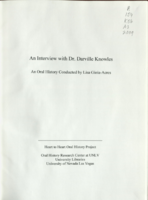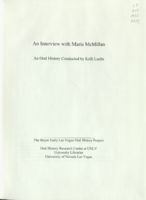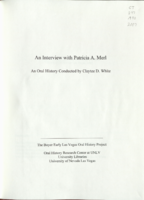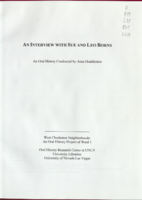Search the Special Collections and Archives Portal
Search Results

Transcript of interview with Eldon Cooper by Kamal Whilelm, March 3, 1975
Date
Archival Collection
Description
On March 3, 1975, Kamal Wilhelm interviewed Eldon G. Cooper (born 1922 in Overton, Nevada) about his experiences in Southern Nevada. Also present are Cooper’s wife and several unnamed adults in the background. Cooper first talks about his background and his eventual move to Las Vegas before describing the recreational activities in which he and his family took part. He later describes the atomic testing, environmental changes, modes of transportation, social changes, and tourism in Las Vegas. Cooper also discusses the Stewart Ranch, and his wife describes the setting of multiple photographs taken of properties in the Downtown Las Vegas area.
Text

Transcript of interview with Ralph Denton by K.J. Evans, approximately 1999-2000
Date
Archival Collection
Description
On an unknown date (likely 1999-2000) and time, K.J. Evans interviewed Ralph Denton, an adviser to former Governor Grant Sawyer and political figure in Nevada for many years. Denton first talks about his personal friendship with Sawyer, their education in law school, and his eventual work on campaigning for and working with Sawyer after he became governor. Denton then explains the controversy regarding Denton’s accepting of complimentary services (comps) at hotels. He later describes his work as a Clark County Commissioner and then talks about working as district attorney in Esmeralda County, Nevada. Denton then talks about the influences that led him to be interested in a career of law and later speaks more about working with Grant Sawyer, specifically about serving as his adviser, afterwards providing the argument on why he believes Sawyer was the greatest governor of Nevada. Toward the latter part of the interview, Denton describes his work on improving civil rights and some of the challenges that came with that. The two also discuss how the practice of law has changed over time. To conclude the interview, Denton describes his experience in running for governor and how he would have served as governor if he had been elected.
Text

Transcript of interview with Lois Cox by Mitch Cox, March 18, 1978
Date
Archival Collection
Description
On March 18, 1978, Mitch Cox interviewed Lois Cox (born 1938 in Ely, Nevada) about her experiences growing up in and living in Nevada. Cox first talks about her family background and then discusses her educational and employment backgrounds. She then describes her work for the Clark County School District, the changes in schools over time, and her opinions on how student activities have changed. The topics then shift to Cox’s opinions on some of Nevada’s politicians, her Basque background, and the changes in Las Vegas over time, particularly those related to gambling.
Text

Transcript of interview with Roger Hurley Dudley by Beth McLaren, March 7, 1981
Date
Archival Collection
Description
On March 7, 1981, Elisabeth McLaren interviewed blackjack dealer, Roger H. Dudley (born August 10th, 1940 in Las Vegas, Nevada) in his home. This interview covers Roger’s recollections on growing up in Las Vegas. During the interview they further discuss Roger’s childhood, his parents, grade school, World War II, the atomic testing, the Mesquite Club, the development of the Strip, rodeos, Howard Hughes, Paradise Valley and changes in Las Vegas, Nevada.
Text

Ron Current interview, March 16, 2012: transcript
Date
Archival Collection
Description
Ron Current's heart was always in the right place, with respect to social activism and his dedication to empowering the black community in Las Vegas. Inspired by Black Panther Party founders, Huey P. Newton and Bobby Seale, Ron started the Black Panther Party Las Vegas Chapter. He was also the director of public relations for the National Alliance Against Racist and Political Repression; an organization created to work in tandem with the National Association for the Advancement of Colored People, NAACP, to eliminate racial inequality. Ron describes the overall atmosphere of the Westside community in Las Vegas during the early days, as chaotic, drug infested, and riddled with daily gang related shootings. He also recalls the historic preservation attempts made by leading members of the Westside community, such as Sarann Knight Preddy. Ron recalls working at the University Medical Center while recruiting for the Black Panther Party Las Vegas Chapter. This interview demonstrates the power of love. As the founder and leader of the Black Panther Party Las Vegas Chapter, Ron was named one of the most influential blacks in Las Vegas by the Sentinel Voice. He recalls utilizing his hands-on leadership approach towards capacity building and the successful implementation of community mobilization strategies and methods. He was a champion for educational equity, equal access to employment opportunities, and economic equality in Las Vegas, Nevada.
Text

Transcript of interview with Dorothy George by Claytee White, October 13, 2003
Date
Archival Collection
Description
After serving as a nurse in World War II in Hawaii, Okinawa and Japan, Dorothy returned home to Chippewa Falls, Wisconsin. She experienced a particularly bad winter and she set out for California but stopped in Las Vegas to visit the family of her traveling companion, a girlfriend from her home town. The girlfriend returned to Wisconsin and George applied for a nursing license and got it within three days. She never left. Dorothy met her husband while working the night shift at Clark County Hospital. He would come in regularly to assist his patients in the births of their babies. Their occupations and their service in World War II drew them together in a marriage that has lasted over fifty years. From 1949 to this interview in 2003, Dorothy George has seen Las Vegas grow from a town that she loved to a metropolitan area that is no longer as friendly. She reminisces about the Heldorado parades, family picnics at Mount Charleston, watching the cloud formed by the atomic bomb tests, raising six successful children, leading a Girl Scout Troop, and working in organizations to improve the social and civic life of Las Vegas.
Text

Transcript of interview with Dr. Darville Knowles by Lisa Gioia-Acres, October 9, 2008 and November 9, 2008
Date
Archival Collection
Description
Dr. Darville Knowles was born in Miami, Florida, in 1948. His mother and father were schoolteachers in Dade County. After their divorce in 1962, Darville's mother relocated to Las Vegas with her two sons and took a teaching position here. Dr. Knowles comments on the differences between Miami and Las Vegas as far as segregation regarding housing, education, and job opportunities. He also mentions that his grandmother had emigrated from the Bahamas and that she impressed on them to make their own situation and community better. He recalls that track and field athletics were desegregated before the contact sports, such as football and basketball. Darville and his brother Michael (a lawyer in Miami) both graduated from college. Darville attended Howard University and Stanford University Medical School and completed his internship at the Jewish Hospital of St. Louis. Dan Wilkes, a family friend and pathologist in Las Vegas, convinced Darville to look at Las Vegas for job opportunities. After trying St. Louis, Atlanta, Houston, and Los Angeles, Dr. Knowles finally settled in Las Vegas in 1982 and "grew' his practice at Sunrise Hospital. Dr. Knowles comments on health problems in Las Vegas related to eating choices, lack of exercise, and poor air quality. He describes how HMOs have changed the practice of medicine and gives his opinions on how health care should be addressed by Congress. He also discusses the future of medicine, the research he was involved in, and the AIDS crisis. Dr. Knowles talks about how medicine has changed since 1982, the large number of respiratory problems that he treats, and comments further on HMOs and the fixture of medicine in Las Vegas. He also shares that he found time to author a murder mystery and has plans to write more.
Text

Transcript of interview with Marie McMillan by Kelli Luchs, September 15, September 23, October 1, & November 24, 2009
Date
Archival Collection
Description
From an early age, Marie McMillan displayed an adventurous sensibility, a characteristic that is revealed in how life unfolded for her. In this multi-part interview, Marie begins with her birth in 1926 California, and continues with stories of her childhood recollections of the Depression era, her longstanding closeness with Nanny, her maternal grandmother, and memories of Old Bent, her paternal grandfather. She enjoys a flirtatious vitality and attends college for a year. However, as World War II begins to infest the U.S., Marie finds herself falling for a young merchant marine named Duke Daly. They marry, have two children, and live a transient life moving about California and Hawaii as he goes to school, then seeks and finds employment in a postwar economy. By the late 1950s, the Daly household is stressed and begin to split time between California and Las Vegas. Marie holds positions that require security clearance and administrative talents. In 1961, Duke passes away a
Text

Transcript of interview with Pat Merl by Claytee White, October 9 & 28, 2008
Date
Archival Collection
Description
Patricia 'Pat' Merl plans for college did not materialized after graduation from a New Jersey high school in the late 1960s. Instead she took a receptionist job. The by the age of 19, it was her interest in dance classes that would lead her to audition to be a professional dancer for the Rockettes of Radio City Music Hall fame. Her days and weeks were filled with rigorous rehearsals and performances, but it was also an exciting time for a young and spirited girl. A side trip to Las Vegas in 1971 during her first ever vacation opened her to a new world of possibilities for a professional dancer. So without a job, she decides to remain in Las Vegas and explore the options. It became the beginning of a wide and varied career in the live entertainment industry. Pat's dancing resume includes working in many of the Las Vegas chorus lines of the 1970s, provides a flavor of what the work was like then and how it changed during the era. She includes the story of Frank Rosenthal and
Text

Transcript of interview with Leo Borns and Sue Easley Borns by Anna Huddleston, March 21, 2014
Date
Archival Collection
Description
Leo and Sue (Easley) Borns came to Las Vegas in 1962 to begin an architectural career that would last forty-four years in Southern Nevada. Leo Boms worked for various firms in Las Vegas before developing a reputation as "F. Borns, Architect". He has gone on to design buildings for state public works, Clark County, the City of Las Vegas, Clark County School District, churches, and private home owners. Rarely taking a job outside of Southern Nevada, Leo Boms' intent was to develop an architecture considered indigenous to the area while keeping the conservation of energy and technology as prime importance. Mr. and Mrs. Boms, after living in the area for approximately five years, decided to purchase a home on Strong Drive in McNeil Estates where they raised their three children. Active in social and philanthropic organizations, both Leo and Sue have become acquainted with numerous area personalities. Mr. Boms is most proud of being a part of the development of the Kiwanis Water Conservation Park although his structural designs can be seen throughout the Southern Nevada area. At the age of 77, he closed his office but remains an integral influence on the Greater Las Vegas area.
Text
